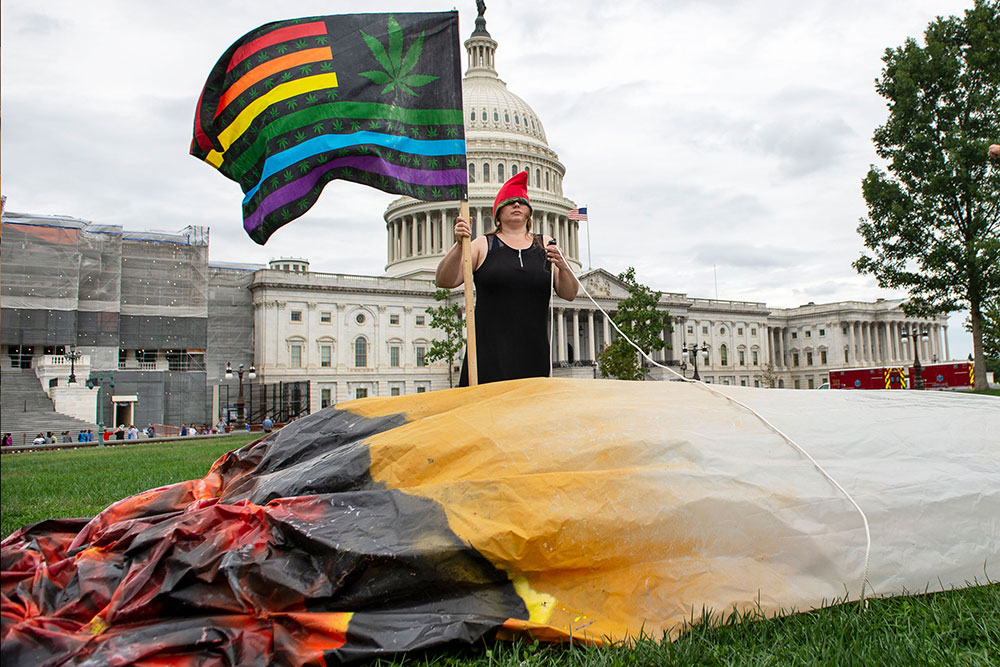亚利桑那州、蒙大拿州、新泽西州和南达科他州即将把娱乐用大麻合法化,另外,南达科他州和密西西比州的选民将批准允许医用大麻的投票提案。
在亚利桑那州,选民以60%支持、40%反对通过第207号提案,将21岁以上的成年人持有和使用娱乐用大麻合法化。亚利桑那州选民在四年前曾经否决了类似的投票提案,但2010年,该州将医用大麻合法化。
新泽西州成为大西洋中部地区第一个将娱乐用大麻合法化的州,选民以67%支持、33%反对通过了1号公共问题。该州在2010年批准医用大麻合法。
在蒙大拿州,选民以57%支持、43%反对,通过了将成年人娱乐用大麻合法化的第I-190号投票提案。蒙大拿州早在2004年就已经批准医用大麻合法。
南达科他州选民对于将娱乐用大麻和医用大麻合法化的不同投票提案分别进行了表决,有关娱乐用大麻的提案以53%支持、47%反对获得通过,关于医用大麻的提案以69%支持、31%反对获得通过。在密西西比州,允许医用大麻的提案获得了超过三分之二选民的支持,这是该“深南州”在放宽大麻管制方面迈出的重要一步。

如果11月3日晚间选举的结果不出现变数,娱乐用大麻将在美国15个州以及哥伦比亚特区合法,35个州以及哥伦比亚特区将允许使用医用大麻。
虽然联邦政府依旧禁止大麻及其深加工产品,但最近几年,一方面公众对待大麻的态度正在发生改变,另一方面各州希望将现有规模庞大的非法市场纳入监管,因此越来越多的州在推动大麻合法化。这些努力使加州和科罗拉多州等地出现了繁荣的大麻行业,让各州获利丰厚,为各州政府创造了数亿美元的税收。
新冠疫情对美国经济造成了毁灭性的打击,导致各州和地方政府纷纷面临严重的预算不足,因此未来几年,预计会有更多州考虑将大麻合法化。例如,新泽西州成功通过将大麻合法化的提案,将刺激东北部和大西洋中部各州纷纷效仿,其中纽约州的州长安德鲁·科莫已经表示支持大麻在本州的合法化。(财富中文网)
翻译:刘进龙
审校:汪皓
亚利桑那州、蒙大拿州、新泽西州和南达科他州即将把娱乐用大麻合法化,另外,南达科他州和密西西比州的选民将批准允许医用大麻的投票提案。
在亚利桑那州,选民以60%支持、40%反对通过第207号提案,将21岁以上的成年人持有和使用娱乐用大麻合法化。亚利桑那州选民在四年前曾经否决了类似的投票提案,但2010年,该州将医用大麻合法化。
新泽西州成为大西洋中部地区第一个将娱乐用大麻合法化的州,选民以67%支持、33%反对通过了1号公共问题。该州在2010年批准医用大麻合法。
在蒙大拿州,选民以57%支持、43%反对,通过了将成年人娱乐用大麻合法化的第I-190号投票提案。蒙大拿州早在2004年就已经批准医用大麻合法。
南达科他州选民对于将娱乐用大麻和医用大麻合法化的不同投票提案分别进行了表决,有关娱乐用大麻的提案以53%支持、47%反对获得通过,关于医用大麻的提案以69%支持、31%反对获得通过。在密西西比州,允许医用大麻的提案获得了超过三分之二选民的支持,这是该“深南州”在放宽大麻管制方面迈出的重要一步。
如果11月3日晚间选举的结果不出现变数,娱乐用大麻将在美国15个州以及哥伦比亚特区合法,35个州以及哥伦比亚特区将允许使用医用大麻。
虽然联邦政府依旧禁止大麻及其深加工产品,但最近几年,一方面公众对待大麻的态度正在发生改变,另一方面各州希望将现有规模庞大的非法市场纳入监管,因此越来越多的州在推动大麻合法化。这些努力使加州和科罗拉多州等地出现了繁荣的大麻行业,让各州获利丰厚,为各州政府创造了数亿美元的税收。
新冠疫情对美国经济造成了毁灭性的打击,导致各州和地方政府纷纷面临严重的预算不足,因此未来几年,预计会有更多州考虑将大麻合法化。例如,新泽西州成功通过将大麻合法化的提案,将刺激东北部和大西洋中部各州纷纷效仿,其中纽约州的州长安德鲁·科莫已经表示支持大麻在本州的合法化。(财富中文网)
翻译:刘进龙
审校:汪皓
Arizona, Montana, New Jersey, and South Dakota are braced to become the latest states to legalize the recreational use of cannabis, with voters in South Dakota and Mississippi also set to approve ballot initiatives permitting medical marijuana use.
In Arizona, voters decided by a 60% to 40% margin in favor of Proposition 207, an initiative legalizing the recreational possession and use of marijuana by adults aged 21 and over. Arizona voters rejected a similar recreational measure on their ballots four years ago, though the state legalized medical cannabis in 2010.
New Jersey became the first state in the Mid-Atlantic region to legalize recreational cannabis, with Public Question 1 passing by a 67% to 33% margin. The state legalized medical use of the drug in 2010.
In Montana, voters favored ballot initiative I-190, which legalizes recreational adult use in that state, by a margin of 57% to 43%. Medical use has been legal in Montana since 2004.
Voters in South Dakota had their say on separate ballot initiatives legalizing recreational and medical cannabis use, with the recreational measure passing by a 53% to 47% margin and the medical initiative passing 69% to 31%. And in Mississippi, a measure to allow medical marijuana use appeared to gain more than two-thirds support, and could prove a major step forward for initiatives to liberalize cannabis in the Deep South.
If the results from November 3 night’s elections hold, recreational marijuana will now be legal in 15 states plus the District of Columbia, while medical use will be permitted in 35 states plus D.C.
Despite the continued prohibition of cannabis and derived products by the federal government, more states have pushed to legalize marijuana in recent years—driven by evolving public attitudes and a desire to regulate the massive black market that exists for the drug. Those efforts have seen booming, lucrative cannabis industries emerge in states like California and Colorado, with hundreds of millions of dollars in tax revenues flowing into state coffers as a result.
With state and local governments across the U.S. facing major budget shortfalls in the wake of the coronavirus pandemic’s devastating economic impact, more states are expected to consider legalization measures of their own in the years to come. New Jersey’s successful initiative, for instance, is expected to spur neighboring states in the Northeast and Mid-Atlantic U.S. to follow suit—with New York Gov. Andrew Cuomo having expressed support for legalization in his own state.






